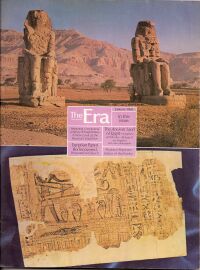Why is the Book of Abraham text not on the papyri?
Questions
The text of the Book of Abraham is not present on any of the recovered fragments of papyri.
Answer
We do not claim to know why the text of the Book of Abraham (or the missing Book of Joseph) is not in evidence on the fragments of papyrus that were recovered. Critics, of course, simply assume this to be conclusive evidence that Joseph was a fraud.
Detailed Analysis
From a believer's perspective, however, there are several possible theories to account for this:
- The text was revealed much in the same manner as that of the Book of Mormon, without the need for the actual papyri.
- The text was present on portions of the papyri that are missing, and the Book of Abraham manuscript was attached to the Book of Breathings manuscript and was lost.
- Perhaps there was a way of understanding the Egyptian ideograms anciently that is unknown to Egyptology in our day, yet to be discovered, deciphered or acknowledged, that could yield an interpretation of a text that is different than the standard Egyptological reading.
- Similar to option 1, the text was revealed, but the papyri acted as a "catalyst" that brought a state of pondering in the mind of Joseph Smith that led to his receiving of the revelation on the text of the Book of Abraham. This is similar to how in the "Zelph Incident" of Zion's Camp, the bones of the Ancient American "Zelph," led to a state of pondering in Joseph Smith's mind, so that he asked the Lord regarding the identity of the individual, and subsequently, he received a revelation on him.
Topics
Summary: We do not claim to know why the text of the Book of Abraham (or the missing Book of Joseph) is not in evidence on the fragments of papyrus that were recovered. Critics, of course, simply assume this to be conclusive evidence that Joseph was a fraud. From a believer's perspective, however, there are several possible theories to account for this: 1) The text was revealed much in the same manner as that of the Book of Mormon, without the need for the actual papyri, 2) The text was present on portions of the papyri that are missing, and 3) The Book of Abraham manuscript was attached to the Book of Breathings manuscript and was lost. 4) Perhaps there was a way of understanding the Egyptian ideograms anciently that is unknown to Egyptology in our day, yet to be discovered, deciphered or acknowledged, that could yield an interpretation of a text that is different than the standard Egyptological reading.
Summary: This theory assumes that the Book of Abraham
was not on the papyri; he received the text by revelation, with the papyri acting as a catalyst. This is a possibility because Joseph used the word "translation" to mean several things, including the process of receiving pure revelation. (Joseph Smith's revelations call his revision of the Bible a "translation" (
D&C 73:4; 76:15; 90:13; 94:10; 124:89), even though he didn't use any Hebrew of Greek manuscripts. Also,
DC 7 is a revealed translation of a lost record written by the Apostle John.)
Summary: This theory assumes that the Book of Abraham
was on the papyri in Joseph Smith's possession, but the portion recovered from the Metropolitan Museum doesn't include it. This is a possibility because the recovered portion is less than 13% of the total material held by Joseph.
Cite error: Closing </ref> missing for <ref> tag
Summary: This theory assumes that the Book of Abraham was on a scroll which is no longer extant. While it's true that the extant portions of the JSP are from the Book of the Dead and the Book of Breathings and do not, according to Egyptologists, translate to anything like the LDS Book of Abraham, this doesn't necessarily mean that the translation didn't derive from Joseph's papyri. There are other scenarios that are compatible with Joseph's claims. We know from other sources, for instance, that sometimes scrolls were attached together.
<videoflash>76kANp4cxQg</videoflash>
==
==


